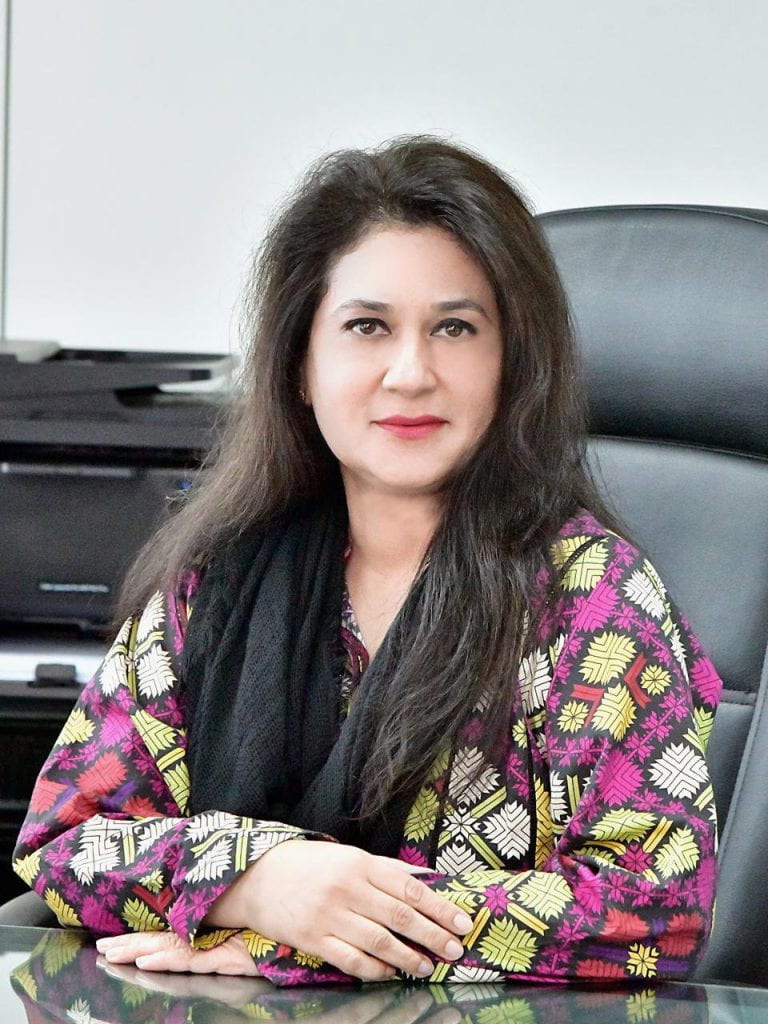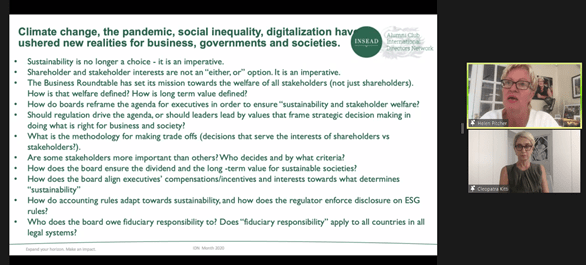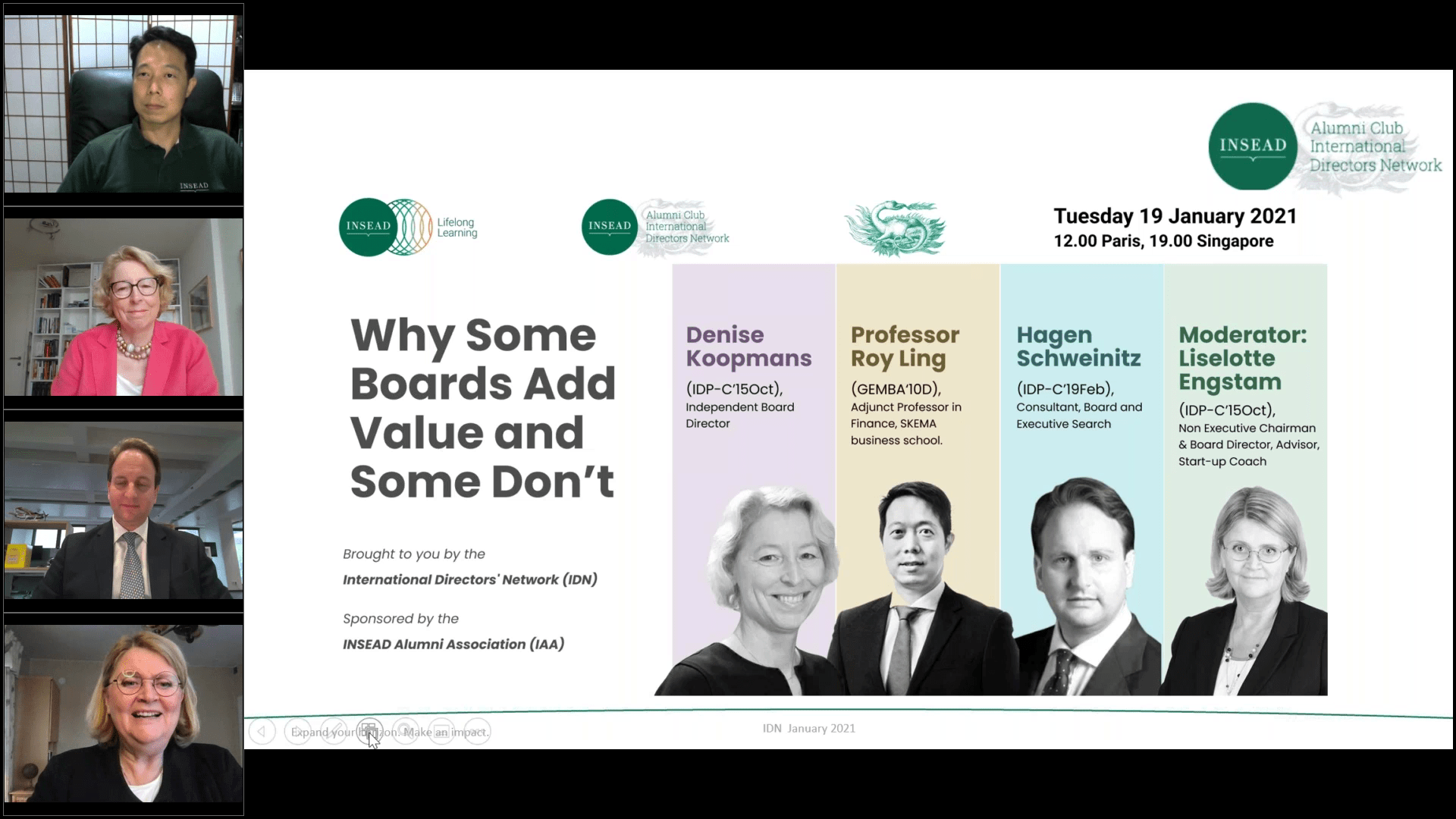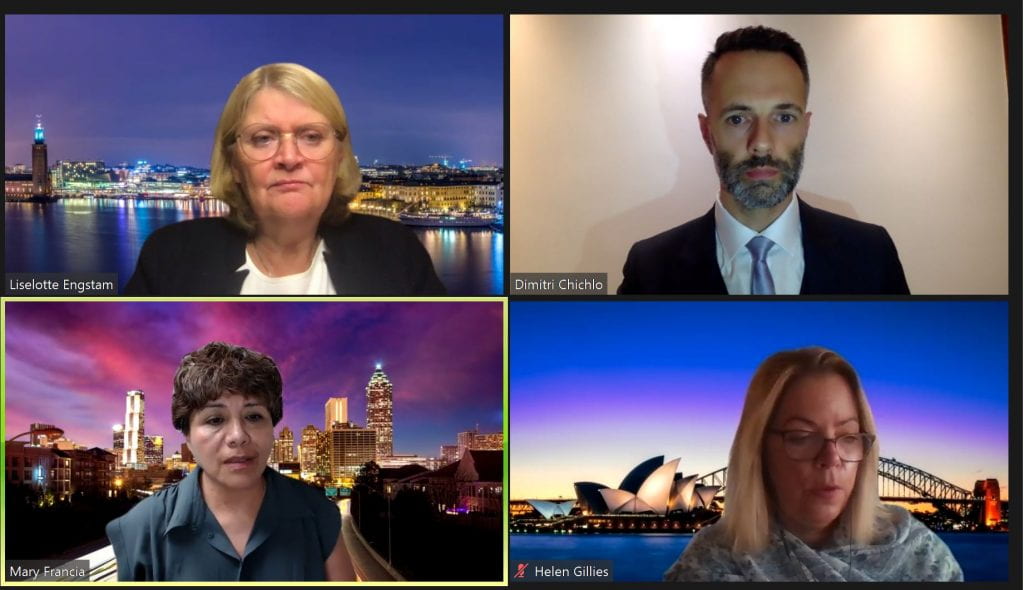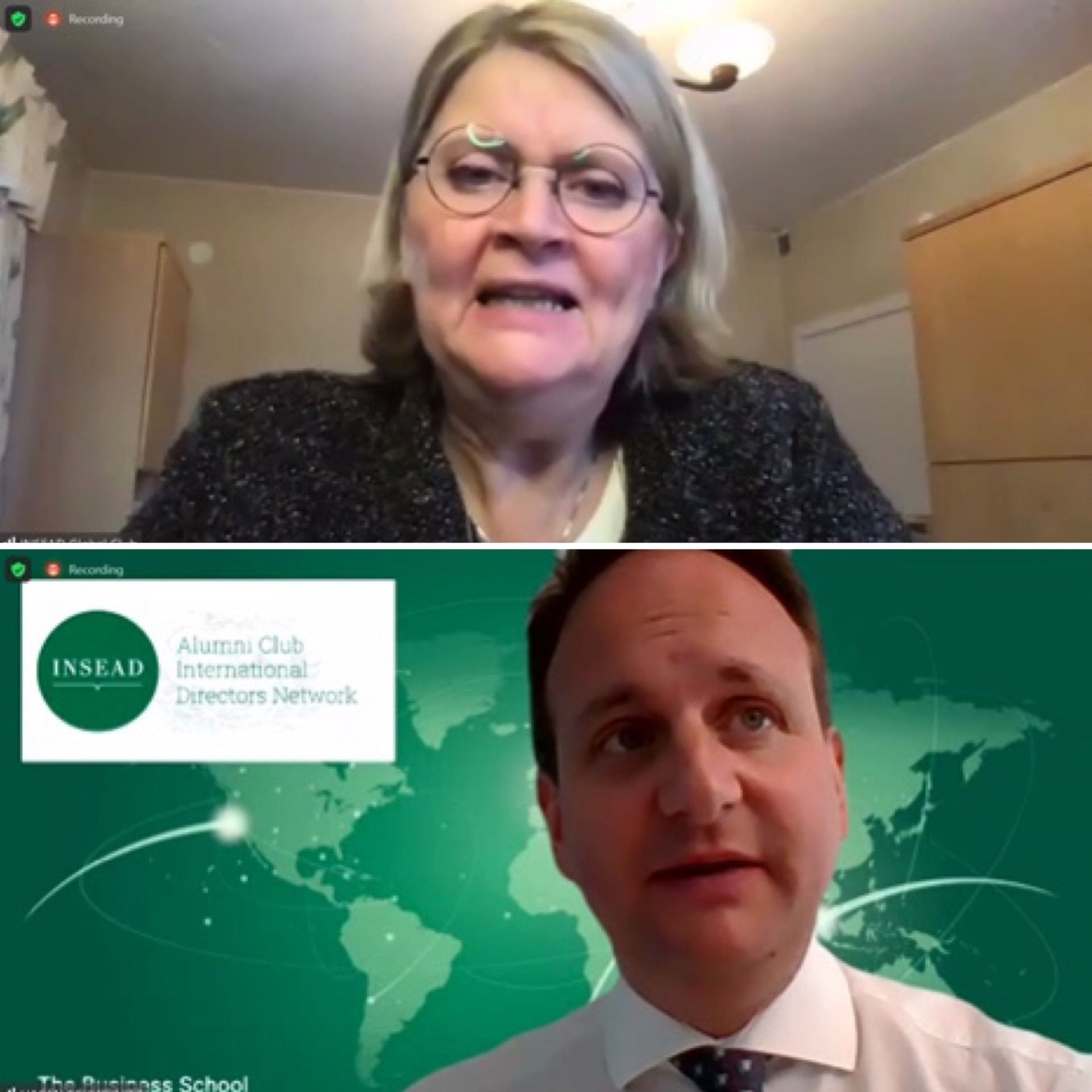25 March 2022
Members Board & Corporate Governance Positions Announcement 1 September 2021 to 31 January 2022
INSEAD International Directors Network, IDN, is proudly sharing the recent appointments of board and corporate governance positions of our members, truly recognizing our members and the strength of our IDN network.
IDN members has been appointed to 48 new board positions in 19 countries, summing up to 545 position announcements since 2017.

As a member of IDN, the network of INSEAD International Board Directors, with full membership open to all INSEAD Alumni with appropriate directorship experience and which is automatic for Certified Directors (IDP-C) from INSEAD’s International Directors Programme (IDP), you can be truly proud of your network!
You find the IDN members with new board positions below, and why don’t you help share our network’s achievement via Linkedin, to help position also yourself and your membership of a vibrant network via this LinkedIn post.
And take the time to connect with your fellow IDN members at LinkedIn and expand your board contacts, by clicking their names below and connect with them!
IDN works closely with INSEAD Corporate Governance Centre, which undertakes cutting-edge research and teaching tailored to the needs of boards and international directors. It fosters a global dialogue on the challenges of corporate governance and leadership in an international context.
INSEAD Directors’ Network – Members New Board & Corporate Governance Positions
IDN members – Certified IDP-C Board Directors
Carlos Alonso-Marum – https://www.linkedin.com/in/carlos-alonso-marum/ December 2021 – Chairman of the Board at Cardioline S.p.A. (PE-backed, HQ Italy)
Carin Beumer– https://www.linkedin.com/in/carin-beumer-40840328/ December 2021 – Non-Executive Board Director ACSSA & Aiglon College Association (Private, HQ Switzerland)
Deborah Carlson-Burkart – https://www.linkedin.com/in/d%C3%A9borah-carlson-burkart/ November 2021 – Board and ACC member at RUAG International Holding SA, (Government owned, HQ in Switzerland), October 2021 – National Office Board member, Right to Play Foundation (Non-for-profit, HQ Canada)
Katia Ciesielska – https://www.linkedin.com/in/katiaciesielska/December 2021 – Non-Executive Director at Main Source S.A. (Sorgente Group, Private, HQ Luxembourg)
Elisabetta Cugnasca – https://www.linkedin.com/in/elisabetta-cugnasca-1162a94/ September 2021 – Independent board member at Zurich Bank Italy (Private, HQ Italy)
Gerry Fitzpatrick https://www.linkedin.com/in/dhersmp/ July 2021 – Chairman at Virtu ITG Europe Limited (a subsidiary of Virtu Financial) (Private, HQ Ireland) and September 2021 – Non-executive Director at University College Dublin (UCD) Foundation (Private, HQ Ireland)
Ioannis Georgoulas – https://www.linkedin.com/in/john-georgoulas/ January 2022 – Non-executive Director at Swissquote (Private, HQ Switzerland)
Fennemiek Gommer – https://www.linkedin.com/in/fennemiekgommer/ September 2021 – Chairman at Walraven (Family-owned, HQ The Netherlands)
Michael Hilb – https://www.linkedin.com/in/michaelhilb/ January 2022 – Chairman at International Board Foundation (Private, HQ Switzerland)
Sirin Kont – https://www.linkedin.com/in/sirinkont/ – July 2021 – Chairman of the Executive Board at American International School Vienna (Not-for-profit, HQ Austria)
Max Kraynov – https://www.linkedin.com/in/maxkraynov/ October 2021 – Chairman at Aviasales (Private, HQ Russia)
Saskia Kunst – https://www.linkedin.com/in/saskia-kunst-25b90531/ January 2022- Non-Executive Director and Member of the Board at Jee Subsea Engineering & Training Ltd. (Private, HQ United Kingdom)
Emmy Labovitch – https://www.linkedin.com/in/emmy-labovitch-finance-ned/ December 2021 – Independent NED and Chair of Risk and Investment Committee at Foresters Life (Private, HQ Canada)
Rob Lelieveld – https://www.linkedin.com/in/roblelieveld/ September 2021 – Non Executive Director at NN Group NV (Listed, HQ The Netherlands)
Richard Lepere – https://www.linkedin.com/in/richard-l-8453617/ January 2022 – Independent Non-executive Director at Clearstream Fund Centre AG, Zurich Switzerland, Deutsche Boerse Group(Private, Switzerland), and December 2021 – Partner at EGP-European Governance Partners, Munsbach Luxembourg (Not for Profit, HQ Luxembourg)
Karen Loon – https://www.linkedin.com/in/karenloon/ November 2021, Member of the Governing Council and Audit Committee Chair at Singapore Institute of Directors (NGO, HQ Singapore)
Magdalena Manea – https://www.linkedin.com/in/magda-manea-b5ba93/ July 2020 – Chair at Seedblink Investors (Private, HQ Romania), October 2021 – Trustee at Romanian American Foundation (Not-for-profit, HQ US)
Marina Niforos – https://www.linkedin.com/in/marina-niforos/ January 2022 – Member of Advisory Board at Urban Impact Ventures (Private, HQ The Netherlands)
Ludo Ooms – https://www.linkedin.com/in/ludoooms/ – January 2022 -Non-Executive Board Director at Maatwerkbedrijf BWB (Private, HQ Belgium)
Helen Pitcher OBE – https://www.linkedin.com/in/helenpitcher/ – Chairman at Public Chairs Forum (Government, HQ United Kingdom)
Monica Porfilio – https://www.linkedin.com/in/monica-porfilio-82925358/ January 2022 – Non-Executive Board Director at Gestielle Investment SICAV (Private, HQ Luxembourg)
Enrica Rimoldi – https://www.linkedin.com/in/enrica-rimoldi-99b27929/ January 2022 – Supervisory Board and Audit Committee member at UniCredit Bank Czech Republic and Slovakia, AS (Regulated, Private, HQ Czech Republic)
Annemieke J.M. Roobeek – https://www.linkedin.com/in/annemiekeroobeek/ November 2021, Non-Executive Board Director at Floating Duck B.V. (Private, HQ The Netherlands)
Andy Schwarzenbach – https://www.linkedin.com/in/schwarzenbach/ September 2021 – Board Member at Flexoffice (Schweiz) AG (Private, HQ Switzerland)
James Sibley – https://www.linkedin.com/in/james-sibley-31b943/ October 2021 – Non Executive Board Director at United Eastern Medical Services (Private, HQ United Arab Emirates)
Oern Stuge – https://www.linkedin.com/in/oern-stuge-5bb93413/ December 2021 -Chairman at TegoSens, (Private, HQ USA)
Jeremy Tan – https://www.linkedin.com/in/jeremytanqw/ September 2021 – Chairman of the Non-Executive Director (NED) Network in Singapore for Winmark Global (Private, HQ Singapore)
Doris Tomanek – https://www.linkedin.com/in/doris-tomanek-68422b13/ November 2021- Member of the Supervisory Board at Schoellerbank AG (Private, HQ Austria)
Axel Tombereau – https://www.linkedin.com/in/axeltombereau/ October 2021- Non-executive director of Aleda (Private, HQ France)
Helen Wiseman – https://www.linkedin.com/in/helenwiseman/ September 2021 – Non -executive Director at SFI Investment Trust (owns Soho Flordis International global healthcare business. December 2021 – Non-executive Director and Chair of the Audit & Risk Committee at Delica Therapeutics Limited (Private, HQ Australia)
Konstantinos Yazitzoglou – https://www.linkedin.com/in/konstantinos-yazitzoglou/ September 2021 – Non-executive Director at Faliro House SA (Private, HQ Greece)
Anna Zanardi Cappon – https://www.linkedin.com/in/annazanardicappon/ – September 2021 – Non-executive Director and Chair of Remuneration Committee at Salvatore Ferragamo S.p.A. – (Listed, HQ Italy)
IDN Members – Board Directors
Stephane Bellanger – https://www.linkedin.com/in/stephanebellanger/ September 2021 – Board member at PMEX (Private, HQ France)
Antonio G. Dottore – https://www.linkedin.com/in/antoniodottore/ January 2022 – Non-Executive Chair of the Academic Board at Australian Institute of Applied Blockchain, (Private, HQ Australia) and December 2021 – Member and Secretary of Committee of Italians Abroad (Com.It.Es.) (Government, HQ Australia)
Wu Gang – https://www.linkedin.com/in/wu-gang-48b03634/ October 2021- Non-Executive Director and member of the Audit and Risk Committee and Management Engagement Committee at Tritax Big Box REIT Plc ( Private, HQ United Kingdom)
Elissa Grey – https://www.linkedin.com/in/elissagrey/ January 2022 – Non Executive Director at Reed Smith LLP (Private, HQ USA)
David Kalife – https://www.linkedin.com/in/davidkalife/ January 2022 Non Executive Board Director at RPRE (Right People Right Energy) ( Private, HQ Singapore)
Jean Marc Lechene – https://www.linkedin.com/in/jean-marc-lechene-343a302a/ December 2021 – Non Executive Director at Lamprell plc (Listed, HQ United Kingdom)
Enoch Li – https://www.linkedin.com/in/nochnoch/ December 2021 – Board Director at United for Global Mental Health (Charity/NGO, HQ United Kingdom)
Thomas Mason – https://www.linkedin.com/in/thomaswmmason/ February 2021 – Non-Executive Director at Farm Engineering Services a Phatisa Fund II Portfolio Company (Private, HQ Mauritius)
Olivier Noel – https://www.linkedin.com/in/olivier-noel-3273636/ September 2021 – Non Executive Director and member of Audit, Risk and Strategy Committees at Activa Finance (Private, HQ Mauritius)
Daniel Wright – https://www.linkedin.com/in/dan-wright-24574195/ – January 2022 – Non-executive Chairman at UInsure Limited (Private, HQ United Kingdom).
Previous announcements and more information
Previous board position announcements by shared by IDN;
October 2021 July 2021 April 2021 December 2020 September 2020 March 2020 October 2019 July 2019 February 2019 November 2018 July 2018 April 2018 January 2018 October 2017
For organisations interested in partnering with IDN, please contact IDN President, Helen Pitcher OBE, at [email protected]
On Behalf of the INSEAD International Directors’ Network Board

